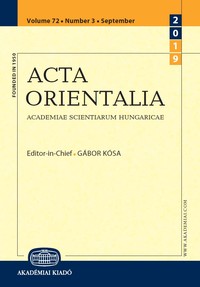Inventing Surnames. A case study of Tabgach identity construction
Inventing Surnames. A case study of Tabgach identity construction
Author(s): Hao ChenSubject(s): Language studies, Cultural history, Ethnohistory
Published by: Akadémiai Kiadó
Keywords: Tabgach; reforms; Sinicization; surnames; Turkic; Mongolic
Summary/Abstract: The Tabgach, as a non-Chinese tribe, ruled North China from the end of 4th century to the middle of 6th century. Through a series of social reforms, Emperor Xiaowen depicted himself as a typical Chinese emperor rather than as a kaghan over the steppe people. One of the reforms he und ertook was a reform of Tabgach surnames. The Tabgach people used Chinese characters to transcribe their proper names. As Chinese characters are single-syllabic, sometimes they had to use several Chinese characters to transcribe a single Tabgach proper name. The multi-character Tabgach surnames sounded exotic to the Chinese people. In order to be accepted by Chinese society, they changed these sophisticated multi-character surnames into simple and traditional Chinese surnames. This paper is going to discuss the methods used by the reform committee in inventing Tabgach surnames.
Journal: Acta Orientalia Academiae Scientiarum Hungaricae
- Issue Year: 73/2020
- Issue No: 4
- Page Range: 521-537
- Page Count: 17
- Language: English
- Content File-PDF

